Zig Zag Claybourne’s Exclusive Interview with A Sinister Quartet Authors
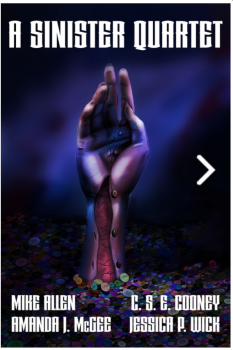 Ah, Horror in the time of Covid! It seems almost superfluous, like a feather boa on an ostrich.
Ah, Horror in the time of Covid! It seems almost superfluous, like a feather boa on an ostrich.
However, we the authors of A Sinister Quartet (Mythic Delirium 2020), have pranced fancily forward on that ostrich! Ostriches piled on ostriches! Feather boas galore! Which feather boas, I might add, sport an unnerving number of teeth and eyeballs.
(Editor and author Mike Allen likes to say of our book: “It’s the fun horror, the kind you consume for imaginative shocks and chills, not the kind that weighs on you like the stones that killed Giles Corey in The Crucible as you helplessly doomscroll through social media.”)
In the spirit of fun then, we approached the rollickingly magnificent Zig Zag Claybourne, who probably has the most fun-on-page of any writer I know–and I live with Carlos Hernandez! (Okay, I confess; it’s a toss-up).
Zig Zag, who’d already read A Sinister Quartet and given it an enthusiastic and incisive review, when asked if he might interview us for Black Gate, generously agreed! His questions were every bit as nuanced, as delicious, as sharp-edged, as playful, as hopeful as his own prose. And so, without any more ado…
ZIG ZAG CLAYBOURNE: When I finished the Advance Readers’ copy of A Sinister Quartet, my thoughts ran this way:
There’s a theme in this book, likely unintended, grown organically out of the times, of not giving up, regardless of fatigue, pain, unfairness or a sense that you are small and meaner forces are grotesquely big.
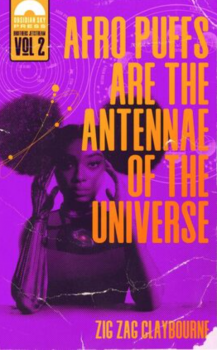 That I got that out of four disparate novellas collected under one roof is a nod to a good editorial eye. Mike Allen is known for such an eye. A Sinister Quartet features new works from eye-mage Allen, World Fantasy Award-winning writer C.S.E. Cooney, knife-throwing Jessica P. Wick, and mirror-dark but bright-in-the-night Amanda J. McGee.
That I got that out of four disparate novellas collected under one roof is a nod to a good editorial eye. Mike Allen is known for such an eye. A Sinister Quartet features new works from eye-mage Allen, World Fantasy Award-winning writer C.S.E. Cooney, knife-throwing Jessica P. Wick, and mirror-dark but bright-in-the-night Amanda J. McGee.
As the collection is dark fantasy, let’s start the first question with a nod to the quintessential crone offering us, the readers, “special” fruit. What’s the poisoned apple elevator pitch for each story? (Some happy child has pressed every floor button in this elevator formed from a cored World Tree, so don’t think you have to be super brief; we have time.)
AMANDA: On my website I describe “Viridian” this way:
It’s grief that drives Lori to Vermont, a land of mountains and hidden lakes and deep snow. She wants to forget everything she’s lost. The rich and mysterious Ethan Locke seems like the perfect man to lose herself in. But every lover has ghosts…
My past self was far more eloquent than my current self, so I’ll let that stand.
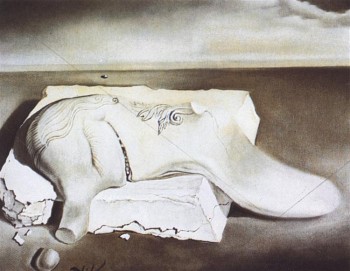 MIKE: Hmm. Maybe “A boy who has experienced something unusual reaches out to the only girl who could understand him, and vice versa. Innocent (and not-so-innocent) bystanders suffer fates worse than death as a result.”
MIKE: Hmm. Maybe “A boy who has experienced something unusual reaches out to the only girl who could understand him, and vice versa. Innocent (and not-so-innocent) bystanders suffer fates worse than death as a result.”
Or maybe, “A monster made of skin and buttons tries to track down and reabsorb the pieces of itself that have gone rogue. Innocent (and not-so-innocent) bystanders suffer fates worse than death as a result.”
What can I say — insert wicked cackle here — it’s fun for the whole family!
JESSICA: Gosh, let’s see.
Were I a crossroads crone, peddling stories to unwary travelers formerly minding their own business, I’d hold up “The Comforter” and say, Dearies, hey! Pause! Why not let yourself disappear into another skin, feel teeth close over you, know what it is to disappear into a distressing, unsettling, patchwork horrorshow? Explore the deeply uncomfortable, the haunted. Do you feel how wet it is, how wrong? How it wraps perfectly around your hand as soon as you touch it, how it lines the interior of your skull? Pulses? The only way out is through, though that might be a lie!
I’d hold up “Viridian” and say, oh, this one. Pretty, isn’t it? Winter no matter the season, cold to the bite. This one you’ll feel like a blanket of snow, like the sparkle of a sleeping limb coming back to life, like grief; this one will haunt you, this one you’ll be the shadow of so many ballad ghosts, and you can’t tell a fictional character to run. You can only watch.
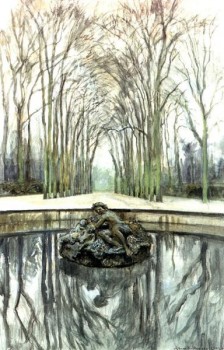 Of “An Unkindness,” I’d say, Tell me how far you’d go to save somebody if they didn’t want to be saved. Tell me the right thing to do. Tell me how to tell if somebody is being true, and be careful where you go in your sleep. Be even more careful of fountains and green glass ways and ravens, of evening and glittering things and what’s underneath. Here. This will help.
Of “An Unkindness,” I’d say, Tell me how far you’d go to save somebody if they didn’t want to be saved. Tell me the right thing to do. Tell me how to tell if somebody is being true, and be careful where you go in your sleep. Be even more careful of fountains and green glass ways and ravens, of evening and glittering things and what’s underneath. Here. This will help.
And of “The Twice-Drowned Saint,” I’d say, hey, see how gorgeous and how fabulous it is? See how this novel is the dark gleaming of pulp and reverence, butterly popcorn, sparkle of candied despair and dream, the hop-to-itiveness of some mellow evening’s libation? Why would you resist something so spectacular, so dazzle-full of grotesquerie and color?
CSEC: Ain’t just the apple that’s poisoned; it’s the whole dang tree.
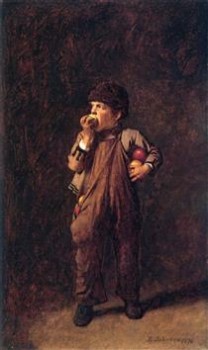 Oh, wait, we were born in that orchard? We’ve been taught all our lives to tend it? To haggle with every crone and god and tyrant who comes our way wanting a poisoned apple and willing to pay anything for it? We’re up to our teeth in cursed treasure we’ve traded for the fruit of our own toxic hands? Well. Hey. So. Does this orchard… have a way out? Doors, anyone? And do we even have legs to walk, or are we rooted fast like our poison, prison trees?
Oh, wait, we were born in that orchard? We’ve been taught all our lives to tend it? To haggle with every crone and god and tyrant who comes our way wanting a poisoned apple and willing to pay anything for it? We’re up to our teeth in cursed treasure we’ve traded for the fruit of our own toxic hands? Well. Hey. So. Does this orchard… have a way out? Doors, anyone? And do we even have legs to walk, or are we rooted fast like our poison, prison trees?
ZIG ZAG: With that pitch in mind, what is the “gift” of the story? Where did you want to take us, how did you want us to feel, in what way did you want our mundane thoughts transformed?
AMANDA: So I feel like there were a couple of things I wanted to unpack in this story. Grief is obviously one. I think it’s a central emotional note that moves through the piece, or I hope so. I’ve been fortunate to love a great number of people, many of whom were much older than me or had ailments that took them away, so I spend a lot of time delving into that in my work for better or worse.
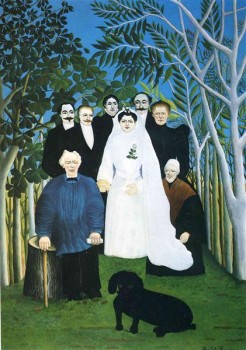 There’s a central theme of loss and healing from loss and the harm you do yourself trying to wrap it up and stuff it down. But I was also wrestling with being newly married around the time I wrote this. One of the things I found is that there is a certain amount of disappearing people expect you to do once you get married, or at least that’s how it felt to me at the time. I had a lot of frustration to work out with that transition in my life.
There’s a central theme of loss and healing from loss and the harm you do yourself trying to wrap it up and stuff it down. But I was also wrestling with being newly married around the time I wrote this. One of the things I found is that there is a certain amount of disappearing people expect you to do once you get married, or at least that’s how it felt to me at the time. I had a lot of frustration to work out with that transition in my life.
I should note that my partner is incredibly supportive and not at all an Ethan. Most of the pressure I felt was around how things changed outside of our relationship — people expecting me to give up my last name and immediately fold into this stereotype womanness. And I got to thinking about how much worse it could have been….
MIKE: A super-kind review by Anthony Cardno used a non-family friendly term to say “The Comforter” masterfully messes with people’s heads, and that’s my surface goal for sure. The Alice Cooper lyric “Welcome to my nightmare” fits as a guiding principle. I want my nightmare to inspire your nightmares.
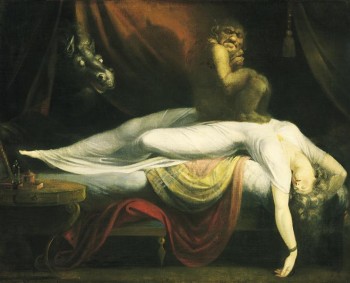 I’ve gotten a little bit of guff for the point-of-view hopping in this novella, but I really wanted to provide a town’s-eye view of the havoc wreaked by these beings, sharing narrative connections with the reader that the poor characters caught in the storm will never fully . . . stitch together, so to speak.
I’ve gotten a little bit of guff for the point-of-view hopping in this novella, but I really wanted to provide a town’s-eye view of the havoc wreaked by these beings, sharing narrative connections with the reader that the poor characters caught in the storm will never fully . . . stitch together, so to speak.
“The Comforter” and its predecessors “The Button Bin” and “The Quiltmaker” do have as a driving engine a kind of anger and disappointment with humanity, perhaps — a notion that systems fail the ones who need them most, that brave words and commitments are only skin deep and the darkness beneath is what’s real. Yet there are those who blaze brighter when that pitch dark tidal wave comes crashing down.
JESSICA: There’s a lot of ‘transformation’ in “An Unkindness,” so I think I might say ideally I want the reader to be conscious of who they are, reading the story, and conscious of who the characters they’re reading about are.
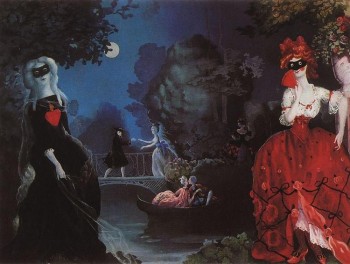 Even those who don’t seem to be wearing a mask aren’t entirely upfront about their motivations or their hopes. Many of the characters are in their motivations, opaque in their desires. Even Ravenna, who tells you exactly what she’s trying to do, is doing it for more than one reason. Or rather, the reason she’s doing it is complicated.
Even those who don’t seem to be wearing a mask aren’t entirely upfront about their motivations or their hopes. Many of the characters are in their motivations, opaque in their desires. Even Ravenna, who tells you exactly what she’s trying to do, is doing it for more than one reason. Or rather, the reason she’s doing it is complicated.
“An Unkindness” is pure secondary world fairy tale fantasy — with a Fairyland I wanted people to recognize without ever outright calling it Definitely-Fairyland — but at it’s heart is a very mundane tragedy. I wanted people to think about that. I wanted people to think about what they would do if. It’s not an easy question. Supporting those we love feels like it should be easy, but right answers aren’t necessarily simple.
The “gift” of this story — in a, you’ve-bitten-into-this-fruit, poor-sucker, now-you’re-in-for-it sort’ve way — could be recognition of that. That the right thing to do isn’t simple or easy, and maybe later you won’t be sure.
CSEC: The gift I want to give, riffing on your earlier question of the poisoned offering, is a way out. Fantasy fiction is so much about escape. What are we escaping out of? Or into?
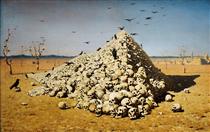 Take someone who’s insisted all their lives on being utterly ordinary, someone whom fear has made small, someone jaded, privileged, middle-aged. Then frighten them. Frighten them enough, startle them awake with new ideas, wider community, the hope of horizon. Offer them something better than their own weary comfort—that is, freedom, or a chance at it—and then, even at the risk of torture and/or death, a person might just take it.
Take someone who’s insisted all their lives on being utterly ordinary, someone whom fear has made small, someone jaded, privileged, middle-aged. Then frighten them. Frighten them enough, startle them awake with new ideas, wider community, the hope of horizon. Offer them something better than their own weary comfort—that is, freedom, or a chance at it—and then, even at the risk of torture and/or death, a person might just take it.
And maybe that choice, that burst of action after a lifetime of stasis, maybe that’s the closest to apotheosis any of us can get.
ZIG ZAG: If you could condense into a single flavor the amount of fun you had writing your story, what would it be?
AMANDA: A flavor. Hmm….taken literally the flavor I associate with “Viridian” is rosemary, as I’ve alluded to elsewhere, because rosemary is lovely but also reminds me of ghosts.
But if I had to describe writing “Viridian” I would say it was a profoundly organic process. Some things you force more than others in the creative realm. “Viridian” sort of grew wild. A strangling vine of a story. This is my favorite way to write — when a story has its own momentum and your responsibility is to open the door for it and let it stream out onto the page.
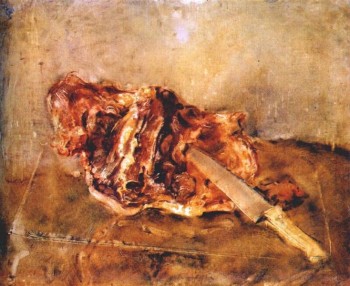 MIKE: Filet mignon served rare.
MIKE: Filet mignon served rare.
JESSICA: First sip of coffee, perfectly balanced with a dash of cardamom and hazelnut, honey and milk. The occasional grind.
CSEC: Warm, mulled perry cider (with a dollop of butter, and some rum) on a cold desert night.
ZIG ZAG: There’s a certain amount of serendipity involved in all fiction, but particularly fantasy, as its entire premise is the embracing of effect without a clear, analyzed or known cause. This is ripe territory for imaginative authors.
Do you feel we’re on the cusp of a resurgence of highly imaginative works, be they retellings of old fables, myths, and folktales or entirely new fables and myths, being hungrily consumed not just by genre stalwarts but the cultural mainstream-at-large?
AMANDA: I hesitate to make predictions in the creative realm. However, I think we are in a place culturally where we almost have to do this work, because we’re moving into a new time, a new world. I think that the whole planet is in the middle of a transformation, and if we’re going to transform successfully we must first transform our stories.
Imagination is hope. But that’s a whole treatise in and of itself.
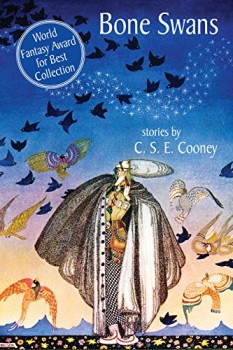 MIKE: I would argue that at least on the writing side, the resurgence (or maybe plain old constant surge) is well underway. My three co-authors provide examples of myths and fables recast in this very book. Claire Cooney won the World Fantasy Award four years ago with a book that contained way more of the same. (I of course have a bias toward Bone Swans, being the publisher and all!)
MIKE: I would argue that at least on the writing side, the resurgence (or maybe plain old constant surge) is well underway. My three co-authors provide examples of myths and fables recast in this very book. Claire Cooney won the World Fantasy Award four years ago with a book that contained way more of the same. (I of course have a bias toward Bone Swans, being the publisher and all!)
Maybe I even partake of this. Scott Dwyer with Plutonian Press, who Knows Things, wrote recently that my stories like “The Comforter” have a fairy tale quality at their core because they’re all about enchanted buttons. It’s funny, I’m not even remotely scared of buttons, it’s just that the flashpoint of inspiration for this whole twisted cosmology hit as I was trawling my arm through a button bin in a craft store . . .
To some degree my entire career as an editor and publisher has this notion baked in. Mythic Delirium (once a zine, now a micropress) has the reference to the mythic right in the name, and so does the anthology series I edited, Clockwork Phoenix. Quite a few writers who work with myth and fable have dallied in my gardens on their way to greater things.
In terms of the readership side, to some extent guessing what will become mainstream is a fool’s game. I do think there’s always going to be an appetite for that fabled flavor.
JESSICA: The brief answer is ‘no,’ but that’s because I don’t believe the highly imaginative works ever went to sleep. The onward march of highly imaginative, mythic or fable-inspired fiction has been relentless, and right out in the open for at least as long as I’ve been alive.
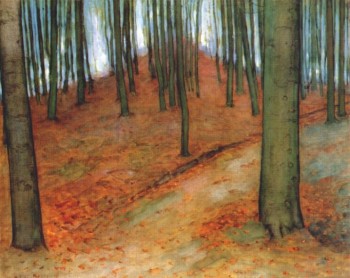 I do believe currently the majority of readers didn’t grow up being told that fantasy wasn’t worth the paper it was printed on. Sure, I remember some prejudice against genre when I was in school, but mostly people were pushing fantasy.
I do believe currently the majority of readers didn’t grow up being told that fantasy wasn’t worth the paper it was printed on. Sure, I remember some prejudice against genre when I was in school, but mostly people were pushing fantasy.
I work in an independent bookshop, and we still get a few people every now and then who won’t read something if it has even a hint of magic, but for the most part readers of all ages are ready to go into the woods. They want the mythic in whatever guise it chooses to present itself, dark fantasy or horror or a literary retelling of a myth or an incendiary ghost story steeped in cultural anguish or a dream of the world gone through an apocalypse (but still here! Super importantly, the world is still here).
I rather like imagining fantasy as the Once and Future, a sleeping king genre, tucked up in some barrow until it’s needed again. But I also think it has always been needful, and so always present.
CSEC: I think we’re always living through a renaissance of imagination. I think we have to be, because an individual human life is so short. Our every act of creation, however consciously or unconsciously we are allowing the engines of previous generations to propel us, yet moves us forward into frontier.
We are constantly innovating, because we must imagine what we cannot learn, and we don’t have time to learn everything first. Our innovations result in or perhaps create the push-back from a cult of nostalgia that insists that the “golden age” of imagination is behind us.
But I think, if that’s true, then we’re in the platinum age right now. And tomorrow? Well, tomorrow’s the palladium age. Gold’s got nothing to the next generation: our hope of the next, bigger, brighter renaissance.
ZIG ZAG: Each story is tonally different but sends echoes to the next. This is a bit of a cheat question, as I’ve gotten to ask it of Mike before, but since we’ve touched on serendipity, seems fair:
Themes of family run through each novella; is fantasy’s penchant for creating found family in one form or other a draw to that particular story form both as writers and readers?
AMANDA: I’ve had the advantage of having a profoundly supportive family despite our collective ups and downs. Despite that I have also accrued a found family in my adulthood. I don’t know if I would say that writing fantasy has drawn me to want to display the strange vagaries relationships can take, or that I read fantasy for its depictions of families, but I do think that to write relationships you have to really explore people and why they cling to one another. And that means really doing character development well. So I think solid depictions of family and found family are artifacts of a character-driven work.
MIKE: Absolutely. Of all things, a wry in-joke posted on Facebook the day I answered this question reminded me of Milo, Tock, and the Humbug from The Phantom Tollbooth. Getting to know them was one of the highlights of my childhood.
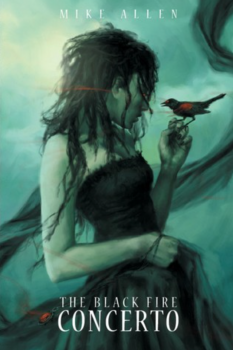 By serendipitous design (heh, heh) A Sinister Quartet features a progression, in that each family we’re introduced to, both blood-related and found, is more troubled than the previous one. Claire has stunning skill at building large, loving families in her fiction. She did it in stories like “Martyr’s Gem” and “The Big Bah-Ha” and she does it again in “The Twice-Drowned Saint.” In Jess’s “An Unkindness” a beloved brother is in danger of being lost to something terrible. In Amanda’s “Viridian” a beloved sister has been claimed by something terrible.
By serendipitous design (heh, heh) A Sinister Quartet features a progression, in that each family we’re introduced to, both blood-related and found, is more troubled than the previous one. Claire has stunning skill at building large, loving families in her fiction. She did it in stories like “Martyr’s Gem” and “The Big Bah-Ha” and she does it again in “The Twice-Drowned Saint.” In Jess’s “An Unkindness” a beloved brother is in danger of being lost to something terrible. In Amanda’s “Viridian” a beloved sister has been claimed by something terrible.
And as for me, well . . . I don’t write found families often. (There’s definitely one in my single published novel to date, The Black Fire Concerto, perhaps not coincidentally edited by Claire!) But at the end of my novella “The Quiltmaker” questions are raised about the ultimate, likely radically different fates of two children, Maddy and Davey. They represented question marks, and the notion began to nag me that one would try to contact the other. Eventually “The Comforter” was the answer.
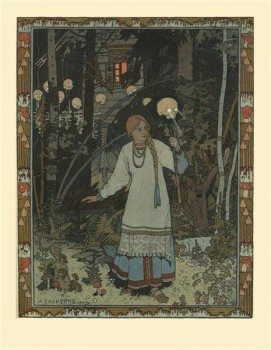 JESSICA: This is such an interesting question, and one I haven’t given a lot of thought previously. I am very fortunate in my found family; fortunate, to have so many people who love me enough to stay and to keep reaching out, even after years spent ‘away in fairyland,’ which is what I have come to call a period of my life where I was so depressed and unhappy and ready to distance myself from living that I honestly have a difficult time remembering things from that period.
JESSICA: This is such an interesting question, and one I haven’t given a lot of thought previously. I am very fortunate in my found family; fortunate, to have so many people who love me enough to stay and to keep reaching out, even after years spent ‘away in fairyland,’ which is what I have come to call a period of my life where I was so depressed and unhappy and ready to distance myself from living that I honestly have a difficult time remembering things from that period.
I’ve always put a high premium on friendship as a motivator, and I think in the fantasy genre you often find yourself reading about friends who become family because other family isn’t available and you (the character) have to survive. That’s certainly attractive to me, as a reader. But I think we all crave, at least just a little bit, that sense of safety that comes from family, whatever you’ve chosen to name ‘family,’ and as a writer and as a reader that’s a theme I’m particularly interested in exploring.
CSEC: For the three main players in “The Twice-Drowned Saint,” there’s both an issue of blood-family and found-family. The narrator, Ish, adores her family—but her dad has heart disease, her mother has dementia, and her beloved uncles are all more or less victims of the angels who rule them. Her only real friend at the beginning is the angel Alizar.
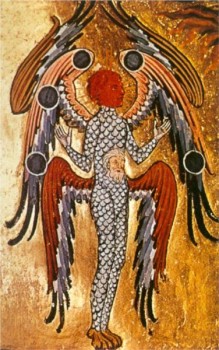 Alizar’s “family” are the other angels, I suppose, but half of them want him dead and the other half are super hooked on human sacrifice and don’t mind who they trample to get it. His only friend is his saint, Ish, who doesn’t want anyone to know they’re “together.” In the angel/saint way, which is complicated.
Alizar’s “family” are the other angels, I suppose, but half of them want him dead and the other half are super hooked on human sacrifice and don’t mind who they trample to get it. His only friend is his saint, Ish, who doesn’t want anyone to know they’re “together.” In the angel/saint way, which is complicated.
Then there’s Betony, who has, in fact, a half-brother, who (you find at the very beginning) was willing to sacrifice her for his own citizenship, because he’s a kid, and starving, and the world is war-torn, and he’s dead tired. Also, because maybe a god made him do it. You know?
Families are complicated. And when Ish and Betony and Alizar find each other, it doesn’t really get any less complicated. It just, with new infusion of community comes new ideas, and with new ideas, the capacity for change becomes a little more possible.
ZIG ZAG: Part of the fun of being writers is the giddy levels of book love we are never hesitant to share! What have you read recently that took you on such a ride that your whee levels popped eleven on a scale of ten?
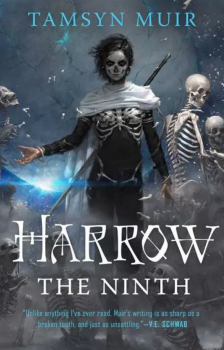 AMANDA: Oh man. Harrow the Ninth made me just absolutely want to experiment with form. The way that book was pulled together was fascinating. Plus who doesn’t love skeletons and possessions?
AMANDA: Oh man. Harrow the Ninth made me just absolutely want to experiment with form. The way that book was pulled together was fascinating. Plus who doesn’t love skeletons and possessions?
What else….I really enjoyed the recent Emerald Blaze on the romance/uf side of things — though my favorite book by Ilona Andrews is probably Sweep of the Blade which is more scifi/fantasy/romance goodness. The world-building for all of their (Gordon and Ilona’s) books is so incredibly well researched. Upright Women Wanted by Sarah Gailey is probably my favorite novella I’ve read recently. I really love Weird Western tales.
MIKE: You mean, other than the stories in Sinister? I’m going to be honest, it’s been a real struggle for me to make time and brainspace to read this year.
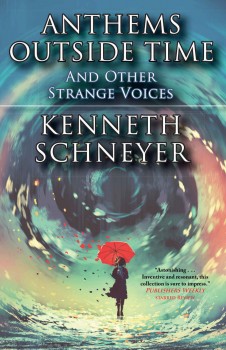 That said, I want to put a plug in for Kenneth Schneyer’s terrific story collection Anthems Outside Time, for which I had the honor of writing the introduction. It holds a range of science fiction, fantasy and even, dare I say it, a little horror.
That said, I want to put a plug in for Kenneth Schneyer’s terrific story collection Anthems Outside Time, for which I had the honor of writing the introduction. It holds a range of science fiction, fantasy and even, dare I say it, a little horror.
To highlight just a couple of the morsels, “Life of the Author Plus Seventy” is a hilarious sci-fi yarn that’s rooted, of all things, in copyright law, and “The Plausibility of Dragons” suggests a supernatural reason why people who ought to know better keep insisting that no woman warriors or Black characters of any kind were around in Medieval Europe, and that reason is both funny and disturbing.
Not to mention there’s his incredibly moving Nebula and Sturgeon award-nominated tale “Selected Program Notes from the Retrospective Exhibition of Theresa Rosenberg Latimer,” but of course I’m biased as I published it first!
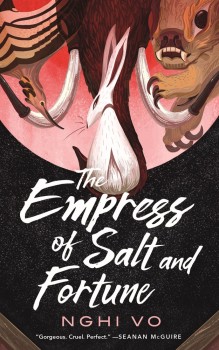 JESSICA: This year has been a difficult one in terms of reading, but I loved Nghi Vo’s An Empress of Salt and Fortune so very much. And I thought Natalie Zina Walschots’ Hench was just utterly brilliant, managing to be two very different stories at once in just the coolest darned way I want to endlessly discuss with people while also cosplaying a some of the characters.
JESSICA: This year has been a difficult one in terms of reading, but I loved Nghi Vo’s An Empress of Salt and Fortune so very much. And I thought Natalie Zina Walschots’ Hench was just utterly brilliant, managing to be two very different stories at once in just the coolest darned way I want to endlessly discuss with people while also cosplaying a some of the characters.
And I re-read Lud-in-the-Mist by Hope Mirles, as I often do, and it is one of the books of my heart, which I feel my bones drawn from — and it never fails to satisfy me, to make me gleeful!
Oh oh oh oh! The Daughters of Ys by M.T. Anderson, which is a graphic novel retelling of the legend of Ys, made me so happy when I ran across it on the shelves! I love a drowned city, I love a creepy fairy bargain (she typed, not shifty-eyed at all), and the art — I swoon. I want to see it animated, Secret of Kells-style, retaining its drifty atmospheric style.
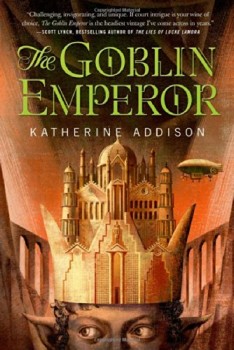 CSEC: My greatest giddymaker this year so far was my discovery of Katherine Addison. I mean, I read The Goblin Emperor, and I was like WHERE HAVE YOU BEEN ALL MY LIFE??? And then I got to blurb its sequel, the forthcoming Witness for the Dead, and then I read her wing-fic, gender-bendy Sherlock Holmes book, The Angel of Crows, and then… Then there was nothing, and I despaired.
CSEC: My greatest giddymaker this year so far was my discovery of Katherine Addison. I mean, I read The Goblin Emperor, and I was like WHERE HAVE YOU BEEN ALL MY LIFE??? And then I got to blurb its sequel, the forthcoming Witness for the Dead, and then I read her wing-fic, gender-bendy Sherlock Holmes book, The Angel of Crows, and then… Then there was nothing, and I despaired.
…Until critic Rich Horton popped onto my Facebook timeline to inform me that Katherine Addison is IN FACT also SARAH MONETTE. And lo! I had SO MANY MORE BOOKS TO READ. Which I then did. That is to say, the entire Doctrine of Labyrinths tetralogy, and a good solid start on The Bone Key.
I also read, with great pleasure, Kathleen Jennings’ Travelogues: Vignettes from Trains in Motions, which began as a series of live tweets from train rides. If you ever wondered what would happen if Vincent Van Gogh collided with Walt Whitman on a moving train, and the explosion of stars and tweety-birds resulting from that skulltacular collision flew up into the ether and coalesced into an award-winning fantasy artist and writer, Travelogues is the sort of thing she’d write.
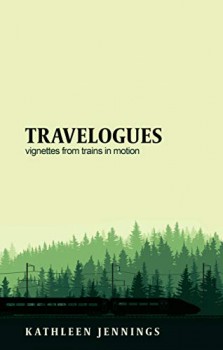 I’m also dying over the book Landmarks, by Robert Macfarlane, which draws the vocabulary of place-specific words from many languages over many years. It makes me drool. I want to know all the words for all the things ever.
I’m also dying over the book Landmarks, by Robert Macfarlane, which draws the vocabulary of place-specific words from many languages over many years. It makes me drool. I want to know all the words for all the things ever.
ZIG ZAG: How many “I wish I’d written that!” moments did the four of you enjoy from your compatriots’ pieces?
AMANDA: This is a hard question, because there were so many! I’ll condense a bit and talk about what my favorite parts of each story were briefly.
For Mike’s I really love how imaginative he can be with his monsters — like he does not shrink from gore. It’s probably strange to say that’s something I’d like to lean into more in my work, but it is. I enjoy just the pure weirdness he comes up with. I think there’s something really uninhibited there — a letting off of the brakes, as it were.
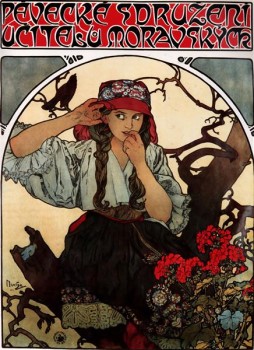 Jess just had the most enjoyable character voice. You really felt like you were talking to Ravenna, like she was telling you everything over tea and biscuits. The way Jess played with sentence structure to achieve that was really fascinating, too, and has made me think a lot about what I can and can’t do in stories — or rather what I’ve told myself I can and can’t do.
Jess just had the most enjoyable character voice. You really felt like you were talking to Ravenna, like she was telling you everything over tea and biscuits. The way Jess played with sentence structure to achieve that was really fascinating, too, and has made me think a lot about what I can and can’t do in stories — or rather what I’ve told myself I can and can’t do.
And Claire’s piece — there’s probably no single thing I can pull out here as the thing I most wish I had written. It was all really amazing. But I think the reason I enjoyed this book so much was because she chose to tell a story of revolution that was compassionate and complicated. I hope that I can remember to be as hopeful in my tales. I think we all need that.
MIKE: Oh, man, so many! I’ll limit it to one each. In “The Twice-Drowned Saint,” that entire epic second chapter which introduces that wonderful and terrifying ritual of sacrifice. In an “An Unkindness,” the escalating unease of the ballroom dance, and especially what I’ll euphemistically refer to as The Unicorn Scene. In “Viridian,” the revelation of what’s locked in the basement and how it’s totally not what you’re expecting.
JESSICA: So many moments! And also … none, because if I’d written something from my compatriots’ pieces, then I’d have had the work of writing those moments instead of the simple pleasure of meeting the stories fresh. But so many, because — I mean, you’ve read the other Sinisters’ work now.
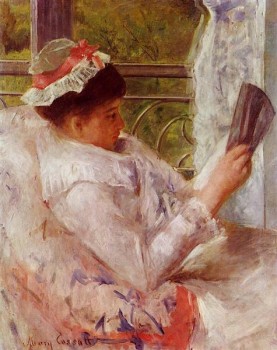 How can I not want the swaggery, incantatory brilliance of C.S.E.’s prose to be mine? It’s almost impossible for me to read C.S.E.’s writing without reading it aloud. How can I not want to string together ballad ghosts like Amanda did or splay out the changing of a season with such meticulous care as she? And how can I not want to write something so horrifyingly fucked up, so utterly distressing as Mike does (again and again, but especially here)? He does body horror in a way that really makes my skin crawl, even just writing how my skin crawls at some of his images I feel myself growing tense.
How can I not want the swaggery, incantatory brilliance of C.S.E.’s prose to be mine? It’s almost impossible for me to read C.S.E.’s writing without reading it aloud. How can I not want to string together ballad ghosts like Amanda did or splay out the changing of a season with such meticulous care as she? And how can I not want to write something so horrifyingly fucked up, so utterly distressing as Mike does (again and again, but especially here)? He does body horror in a way that really makes my skin crawl, even just writing how my skin crawls at some of his images I feel myself growing tense.
But everybody’s work contained at least a couple moments where I’d pause and reread, just so I could gnaw again on a line. Reading’s the best — you can have your cake and eat it too and then eat the same perfect delightful bite again if you want!
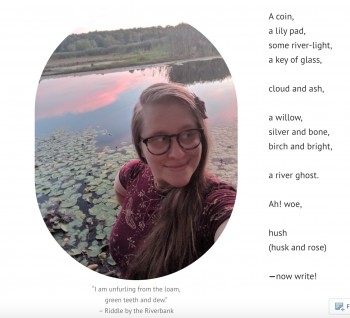 CSEC: Okay, so what you have to know about me is that I’ve been a Jessica P. Wick fan for, what is it now, nearly fifteen years? She and Amal El-Mohtar were some of the first editors to ever publish my poetry at Goblin Fruit Magazine. I literally start drooling the moment my eyeballs hit her first sentences. I sink; I’m lost. Oh, wait, it’s spiky; I writhe. I’m in agony, ouch—only, it’s terribly funny! Give me more! She terrifies me; I am jealous of the very shapes of her paragraphs. Do I wish I’d written “An Unkindness”? A THOUSAND TIMES YES, PLEASE. Thankfully, I got to beta-read several early drafts, which is a really cozy way to be involved with a piece of art you’d rather be wearing or ingesting, unicorn-meat and all.
CSEC: Okay, so what you have to know about me is that I’ve been a Jessica P. Wick fan for, what is it now, nearly fifteen years? She and Amal El-Mohtar were some of the first editors to ever publish my poetry at Goblin Fruit Magazine. I literally start drooling the moment my eyeballs hit her first sentences. I sink; I’m lost. Oh, wait, it’s spiky; I writhe. I’m in agony, ouch—only, it’s terribly funny! Give me more! She terrifies me; I am jealous of the very shapes of her paragraphs. Do I wish I’d written “An Unkindness”? A THOUSAND TIMES YES, PLEASE. Thankfully, I got to beta-read several early drafts, which is a really cozy way to be involved with a piece of art you’d rather be wearing or ingesting, unicorn-meat and all.
What I admire so dearly about Amanda’s work was the very here-ness of it. One of the reasons I’m always writing secondary-world fantasy is that this world, our world, totally bewilders me. I don’t know the names of things. I never know enough about what’s going on with a lightbulb or a fire escape or a freeway or the bumper of a car to write about them with confidence. But Amanda just… she just casually spans the whole United States of America in a single story and seems to think it’s nothing. Easy-breezy. California, Texas, Vermont—it’s all hers to claim, and it feels as real as looking out my window. It stuns me, because I can’t do that.
Mike Allen, now. Mike Allen, Mike Allen, Mike Allen. Who can compare? Start with an unflinching pinch of human ugliness à la Flannery O’Connor, pour in a suppurating dose of Stephen King-y small town-ness, mix in the existential crusty bits of a Lovecraftian nightmare, add a double dose of Southern Gothic atmosphere, and then season it with bad cops, at-risk youth, a couple of Jolly Rancher-bright buttons, and some sentient flaps of flesh, and then put it all in the hands of a poet.
I mean. It may not be your thing. It may not be anyone’s thing. That’s because it’s never been done before. And it’s worth your time.
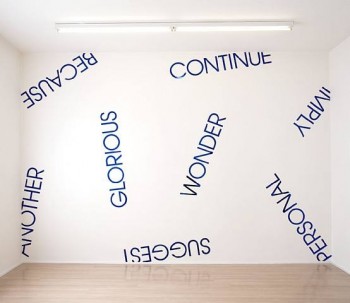 ZIG ZAG: In fantasy, word choice is often the overlooked magic; writers employ a psychology of resonance, letter shapes, and word familiarity or unfamiliarity to slide readers between the veils. How stringent are you about finding that right word, and why?
ZIG ZAG: In fantasy, word choice is often the overlooked magic; writers employ a psychology of resonance, letter shapes, and word familiarity or unfamiliarity to slide readers between the veils. How stringent are you about finding that right word, and why?
AMANDA: I confess that I’m not necessarily a person that picks over individual words. This is a thing I’d like to be more intentional about in some cases, but I am very much intuitive at the line level. For me the best writing is more about images — I get a vision of what I’d like to describe and I feel that at a gut level and the words just sort of happen. If I have a moment where I’m more choosey about words — I’d say that is probably a rhythm thing. Putting sounds together in a way that feels good. It’s all feeling, honestly.
MIKE: As both a writer and an editor, I’m not particularly afraid of using words that might require readers to open a dictionary or resort to Google.
Back in the days when I wrote a lot more poetry I invested a lot of my energy in the sound and flow of words, and I think my approach to prose is very much the same, even when I make an effort to speak plainer. I just can’t help it!
JESSICA: Being unable to find that right word used to stop my writing in its tracks. I used to have a very difficult time because the way the words lie down on a page or in a file is just as important to me, I feel it in my teeth, so I’d keep changing font sizes or fonts in order to get the words to look right, and of course sometimes I’d choose entirely different words in order to get that correct ‘look’ too.
I’ve since managed to keep myself from getting caught (too often) by that urge, because otherwise I’d never finish anything. I’d still rather go without a name than use the wrong one. You’ll note, or maybe you won’t, that Ravenna and Aliver’s country is never named even though another is. And the glittering woman is named, but I don’t refer to her by it (even though I am so pleased to know it).
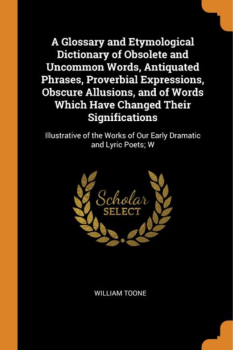 CSEC: Um, there’s this book called A Glossary and Etymological Dictionary of Obsolete and Uncommon Words. It’s like a playground, in book-form.
CSEC: Um, there’s this book called A Glossary and Etymological Dictionary of Obsolete and Uncommon Words. It’s like a playground, in book-form.
Plus Merriam-Webster online. Plus Dictionary/Thesaurus.com. And Etymology Online. And, like, books. With words.
I wouldn’t say I’m “stringent” about words so much as I’m terribly enthusiastic about them. If they surprise and delight me, surely the same will be true for my readers. Now, my older brother says he can’t read anything I write without keeping a dictionary open—but, the thing is, I like books (Michael Chabon, China Miéville, Katherine Addison…) that make me keep my dictionary open. That’s like getting two books for the price of one!
ZIG ZAG: While each story is a slice of dark fantasy, each also has its needles of humor. Which line brought the most delicious grin out of you?
AMANDA: For my own story? I think I enjoyed the character banter the most when it happened. I like seeing Lori pluck up enough to make quips.
My first reaction to this question was that, gosh, nothing happens in “The Comforter” that’s meant to be funny, ha, ha! But then I got to thinking, there are little asides here and there, just a few, that partake of the gallows humor I learned as a connoisseur of horror, that blackened to abyss levels during my years as a journalist covering criminal cases. Having admitted that, I’m going to point to a moment of calm before the storm, when John Hairston, who is essentially part demon, having some inkling of the carnage to come, advises his young companion Aaron Friedrich not to eat breakfast. The chapter ends with, “Aaron chooses to ignore that advice, to his later regret.”
JESSICA: One? I can’t choose one. ‘whitelight of Gelthic noon dazzled’ and ‘By honey and beeswax, I seal you’ and ‘Angel sucker!’ and ‘Waste-cant’ from C.S.E.’s. Yes, I opened the book to find those phrases again, but I knew what I was looking for!
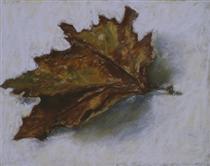 Amanda’s story really struck me as full of grief I understood, but there was one line in particular that pleased me. ‘Mary fell in love quietly, the way that a leaf slips beneath the water.’ Oof, so good.
Amanda’s story really struck me as full of grief I understood, but there was one line in particular that pleased me. ‘Mary fell in love quietly, the way that a leaf slips beneath the water.’ Oof, so good.
Mike’s story… I can’t say I grinned a lot during his story, unless by ‘grin’ you mean ‘grimace of stress and horror and oh god what next,’ but whenever the word ‘flap’ appeared, that was usually a particularly visceral line, which one could sayyy made me react like a tuning fork struck. I say it like there were so many times! Maybe there weren’t and one just really stuck with me. Oh god, am I going to go looking for that line? I am. Hold on. Here it is: ‘It flaps like an insect wing, sliding and swerving, and in doing so spells out a word in wet red smears.’ AAAAAAAAAAAAAGHHHHHH!
But it’s very difficult to choose.
CSEC: Okay. I’ll play.
Jessica: EVERY SINGLE CHAPTER HEADING. (No, seriously. Pay attention. CLASSIC.)
Amanda: All the dead wives ever. When they start talking.
Mike: Oh, little zingers like, “He’s a man with a resting b*&$ch face.” And, oh, there’s more.
Me? Hell, I make myself laugh all the time. I have a weird sense of humor. All my angelic descriptions are indicative of my sense of humor, but my favorite is getting two saints drunk on a rooftop with “benison wine,” or as the lay-people call it, “beer.”
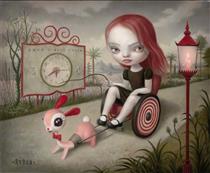
ZIG ZAG: Dark fantasy is often the most hope-inducing of genres in the ways it champions imagination, resolve, and unusually creative problem solving. It also lets us succeed against a few of the million things that make daily life uncomfortable. How important was it to inject and maintain a sense of hope in your stories?
AMANDA: I think it’s incredibly important. Even if it’s a tiny hope, I think hope is what keeps people reading, watching and listening. Maybe that hope is for an individual — that a broken woman finds some peace, in Lori’s case — and maybe it’s for the collective — that a city find liberation from predatory angels, in the case of “The Twice-Drowned Saint.”
Different kinds of hope probably speak to different readers, and you don’t always have to give the characters what they long for. But if there’s no hope at all, that doesn’t seem like an engaging place to be writing from. Or a realistic one. I think hope is fundamentally realistic, because every bad thing has its season but eventually that season, too, passes away. The world being what it is, there will always be wonders and shadows both. And I think some folks get caught up on this and see it as a cause for despair, but I see it as a cause for rejoicing. Nothing is perfect. Which means we can always work to make things better.
 MIKE: You know, there is hope at the end of “The Comforter,” not necessarily in the final note of the ditty but in how, despite reality having gone completely off the rails, there are still people fighting tooth and nail to do the right thing. I have written more than one story where continuing to fight the battle, even though it can’t be won, because it’s what the heart and mind demand, essentially is the point.
MIKE: You know, there is hope at the end of “The Comforter,” not necessarily in the final note of the ditty but in how, despite reality having gone completely off the rails, there are still people fighting tooth and nail to do the right thing. I have written more than one story where continuing to fight the battle, even though it can’t be won, because it’s what the heart and mind demand, essentially is the point.
The conclusion of “The Comforter” is more ambiguous in terms of what has or hasn’t been won. As both an editor and a writer I’m a fan of ambiguity. I like stories that to a degree reflect our messy reality, where answers are muddy and solutions can be double-edged swords–yet pursuing solutions always trumps giving up.
JESSICA: Very. If I’m coming at it from a ‘horror’ or ‘dark fantasy’ angle, I want there to be hope because failure is more terrible when there’s hope. Tragedy feels sharper if it seems as if it could have been avoided. I enjoy wielding a sharpness — but there’s nothing in it if there’s no hope. It was important to me for Ravenna to have hope, for Aliver to respond to hope the way he did, and to leave their story in a — see, I don’t want to spoil anything, so please feel free to block this next bit out if it is too revelatory. It was important for me to leave their story somewhere hopeful, but uncertain. Aliver is not necessarily to be trusted, after all. Nothing is; not even hope.
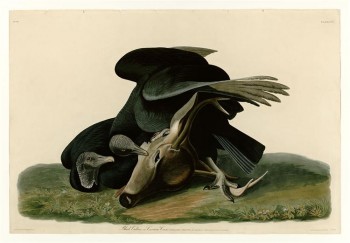
CSEC: Oh, I’ve several times been accused of only writing happy (that is, hopeful) endings. And it’s not like it’s not true, exactly. My early fairy-tale training, I guess.
I know, I know, it’s not at all realistic, and maybe because of that, not really satisfying. But then, I think, well, I’m writing fantasy, and we all get to come to catharsis in our own ways. (Whenever I think of catharsis, I think of turkey vultures, which makes me happy.)
For some people, the only true catharsis is through tragedy and out the other side. Now, I don’t think I avoid tragedy in my stories necessarily; I just don’t tend to end with one. Tragedy is where I begin. And then, like, I take my characters, and I move them from their tragic place through a long, convoluted, fingernail-breaking, lockjaw-inducing, tragedy-piled-on-tragedy, hardscrabble hurricane of a reverse katabasis narrative, is all.
No guarantees at the end of my story that the story beyond it isn’t gonna get scary again. But, maybe, for a moment, respite.
BIOGRAPHIES
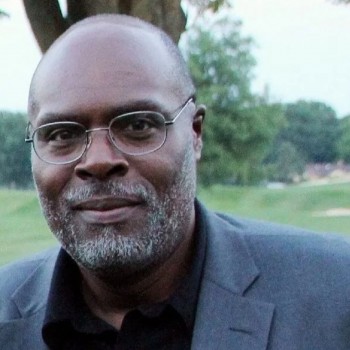 Zig Zag Claybourne is the author of the novels The Brothers Jetstream: Leviathan, Neon Lights, Historical Inaccuracies, By All Our Violent Guides, as well as the upcoming Afro Puffs Are the Antennae of the Universe. He’s frequently seen at Cons being deliriously happy, and knows that one does not refuse karaoke when the mic is offered. His essays and stories have appeared in Apex, GigaNotosaurus, Galaxy’s Edge, Strange Horizons, and other outlets. Find him on the web at www.WriteonRighton.com
Zig Zag Claybourne is the author of the novels The Brothers Jetstream: Leviathan, Neon Lights, Historical Inaccuracies, By All Our Violent Guides, as well as the upcoming Afro Puffs Are the Antennae of the Universe. He’s frequently seen at Cons being deliriously happy, and knows that one does not refuse karaoke when the mic is offered. His essays and stories have appeared in Apex, GigaNotosaurus, Galaxy’s Edge, Strange Horizons, and other outlets. Find him on the web at www.WriteonRighton.com
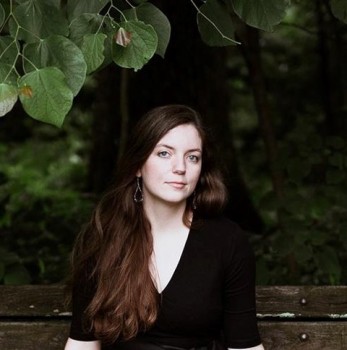 Amanda J. McGee is a mapmaker by day and a writer by night. She has degrees from Hollins University and Virginia Tech, where she studied languages, politics, and infrastructure. Her most recent release is the novella “Viridian,” found in A Sinister Quartet. She also blogs weekly on books, movies, anime, and writing advice. When not writing, she can be found in the garden.
Amanda J. McGee is a mapmaker by day and a writer by night. She has degrees from Hollins University and Virginia Tech, where she studied languages, politics, and infrastructure. Her most recent release is the novella “Viridian,” found in A Sinister Quartet. She also blogs weekly on books, movies, anime, and writing advice. When not writing, she can be found in the garden.
She lives in Southwest Virginia with the love of her life, two fluffy cats, and a plethora of plants. You can find out more on her website at http://amandajmcgee.com.
Mike Allen wears many hats. As editor and publisher of the Mythic Delirium Books imprint, he helmed Mythic Delirium magazine and the five volumes in the Clockwork Phoenix anthology series. His own short stories have been gathered in three collections: Unseaming, The Spider Tapestries and newly-released Aftermath of an Industrial Accident. He’s won the Rhysling Award for poetry three times. A dark fantasy novel, The Black Fire Concerto, appeared in 2013. His novella “The Comforter,” a sequel to his Nebula Award-nominated horror story “The Button Bin,” has just appeared in an anthology of four dark long-form tales, A Sinister Quartet.
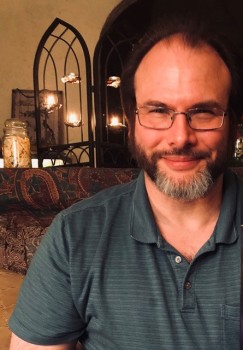 For more than a decade he’s worked as the arts and culture columnist for the daily newspaper in Roanoke, Va., where he and his wife Anita live with a cat so full of trouble she’s named Pandora. You can follow Mike’s exploits as a writer at descentintolight.com, as an editor at mythicdelirium.com, and all at once on Twitter at @mythicdelirium.
For more than a decade he’s worked as the arts and culture columnist for the daily newspaper in Roanoke, Va., where he and his wife Anita live with a cat so full of trouble she’s named Pandora. You can follow Mike’s exploits as a writer at descentintolight.com, as an editor at mythicdelirium.com, and all at once on Twitter at @mythicdelirium.
C. S. E. Cooney (csecooney.com/@csecooney) is the World Fantasy Award-winning author of Bone Swans: Stories. She has narrated over a hundred audiobooks, released three albums as the singer/songwriter Brimstone Rhine, and her short plays have been performed in Chicago, St. Louis, Phoenix, New York City, and Taipei. Her short novel “The Twice-Drowned Saint” can be found in Mythic Delirium’s recent anthology The Sinister Quartet, and her forthcoming novel Saint Death’s Daughter will be out with Solaris in Spring of 2022.
 Other work includes World Fantasy-nominated novella Desdemona and the Deep, and a poetry collection: How to Flirt in Faerieland and Other Wild Rhymes, which features her Rhysling Award-winning “The Sea King’s Second Bride.”
Other work includes World Fantasy-nominated novella Desdemona and the Deep, and a poetry collection: How to Flirt in Faerieland and Other Wild Rhymes, which features her Rhysling Award-winning “The Sea King’s Second Bride.”
Her short fiction and poetry can be found in Jonathan Strahan’s anthology Dragons, Ellen Datlow’s Mad Hatters and March Hares: All-New Stories from the World of Lewis Carroll’s Alice in Wonderland, Rich Horton’s Year’s Best Science Fiction and Fantasy, and elsewhere.
Jessica P. Wick is a writer, poet, and editor. She co-founded Goblin Fruit with Amal El-Mohtar, a quarterly e-zine of fantastical poetry, and is a passionate advocate for the reading aloud of poetry and fiction.
Her poetry has been nominated for the Rhysling Award and received honorable mentions in Year’s Best Fantasy and Horror anthologies. Her short fiction can be found scattered across the internet; recently, her novella “An Unkindness” appeared in Mythic Delirium’s A Sinister Quartet.
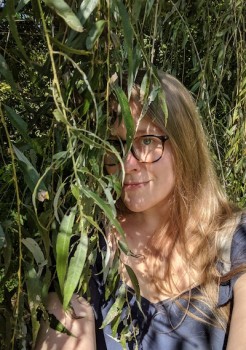 Jessica’s experience as an editor runs the gamut, from full-length novels to short fiction, poetry collections to magazine articles, academic papers to audio works. She also writes reviews for NPR.
Jessica’s experience as an editor runs the gamut, from full-length novels to short fiction, poetry collections to magazine articles, academic papers to audio works. She also writes reviews for NPR.
She currently lives in Westerly, Rhode Island. When she isn’t rambling through cemeteries, gazing wistfully at the breakers, or working on “the swashbuckle-y novel,” she can be found at the independent bookshop where she is assistant manager.